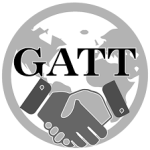In the 18th and 19th century, almost all nations and nation-states believed that protectionism is a must for the well-being of domestic economies. However, with passing time, this idea started to change. The idea of liberalizations and thereby abolishment of protectionist measures peaked in the middle half of the 20th century. The epitome of liberalism took the first palpable shape as GATT, which was later replaced by the WTO.

General Agreement on Tariffs and Trade (GATT) includes some multilateral trade agreements formed to abolish the quotas and reduce various tariffs among the participating nations. GATT was formed by 23 countries signing the agreement at Geneva, in 1947. It was aimed to offer an interim arrangement which could be replaced by a United Nations agency soon.
GATT played a hero’s role in expanding the world trade in the latter half of the 20th century. 125 nations had already become signatories to GATT when it was replaced by the WTO in 1995.


